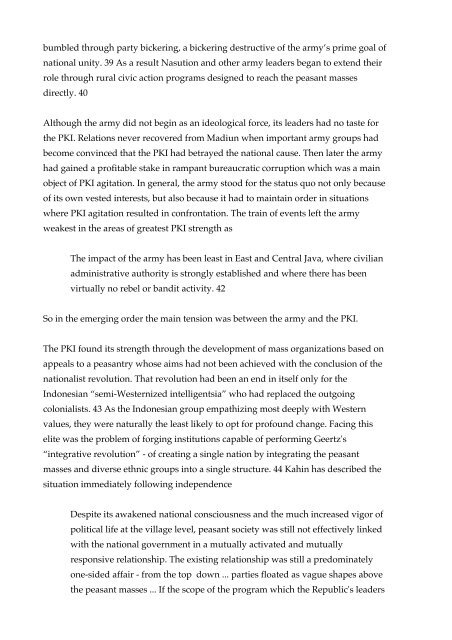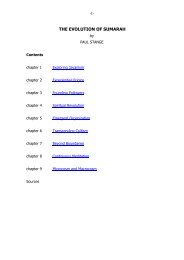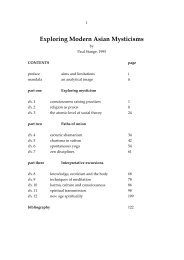Javanese Mystical and Marxist Dialectics - Paul Stange
Javanese Mystical and Marxist Dialectics - Paul Stange
Javanese Mystical and Marxist Dialectics - Paul Stange
You also want an ePaper? Increase the reach of your titles
YUMPU automatically turns print PDFs into web optimized ePapers that Google loves.
umbled through party bickering, a bickering destructive of the army’s prime goal ofnational unity. 39 As a result Nasution <strong>and</strong> other army leaders began to extend theirrole through rural civic action programs designed to reach the peasant massesdirectly. 40Although the army did not begin as an ideological force, its leaders had no taste forthe PKI. Relations never recovered from Madiun when important army groups hadbecome convinced that the PKI had betrayed the national cause. Then later the armyhad gained a profitable stake in rampant bureaucratic corruption which was a mainobject of PKI agitation. In general, the army stood for the status quo not only becauseof its own vested interests, but also because it had to maintain order in situationswhere PKI agitation resulted in confrontation. The train of events left the armyweakest in the areas of greatest PKI strength asThe impact of the army has been least in East <strong>and</strong> Central Java, where civilianadministrative authority is strongly established <strong>and</strong> where there has beenvirtually no rebel or b<strong>and</strong>it activity. 42So in the emerging order the main tension was between the army <strong>and</strong> the PKI.The PKI found its strength through the development of mass organizations based onappeals to a peasantry whose aims had not been achieved with the conclusion of thenationalist revolution. That revolution had been an end in itself only for theIndonesian “semi-Westernized intelligentsia” who had replaced the outgoingcolonialists. 43 As the Indonesian group empathizing most deeply with Westernvalues, they were naturally the least likely to opt for profound change. Facing thiselite was the problem of forging institutions capable of performing Geertz's“integrative revolution” - of creating a single nation by integrating the peasantmasses <strong>and</strong> diverse ethnic groups into a single structure. 44 Kahin has described thesituation immediately following independenceDespite its awakened national consciousness <strong>and</strong> the much increased vigor ofpolitical life at the village level, peasant society was still not effectively linkedwith the national government in a mutually activated <strong>and</strong> mutuallyresponsive relationship. The existing relationship was still a predominatelyone-sided affair - from the top down ... parties floated as vague shapes abovethe peasant masses ... If the scope of the program which the Republic's leaders




